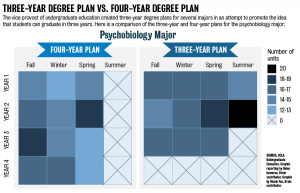The vice provost of undergraduate education formalized three-year plans for about 30 majors in an attempt to prompt students to graduate early, following a push from Gov. Jerry Brown to reduce the cost of higher education for University of California students.
Vice Provost Patricia Turner is working with Gov. Brown to create three-year schedules for the 15 most popular majors at UCLA, including chemical engineering, psychobiology and history, among others, by June 2017. Last spring, Turner began to compile a list of about 30 accelerated programs.
The May deal between Gov. Brown and University of California President Janet Napolitano mandated the creation of three-year academic tracks for the 15 most popular majors at each UC campus in exchange for keeping UC resident tuition rates stable for the next two years.
The three-year program for undergraduates is geared toward students who want to graduate in three years with a four-year bachelor’s degree, said Corey Hollis, the director of academic advising. She added participating students are still required to obtain 180 units to graduate and said that the university does not aim to create a separate three-year degree.
Students who choose to graduate in three years will have to take between 15 to 19 units per quarter, including taking courses in the summer.
Completing a four-year degree in three years can make a substantial financial difference, Hollis added. Turner said that students can save about a year’s worth of tuition and room and board for about $34,000. However, that does not include the cost of summer session.
Most students will have to take summer session classes to more easily graduate in a three-year period, Hollis said. Summer classes cost around $1,200 per four-unit class.
Jaime Balboa, executive director of communications, academic planning and external partnerships at the division of undergraduate education, said students can graduate in three-years with the classes already offered in summer. Balboa said he does not expect to add a significant more amount of classes to the 1,000 currently offered.
Though Gov. Brown directed all UC campuses to create three-year degree pathways, Turner said she thinks there are some benefits to an accelerated program.
“Most students who graduate in three years have a higher GPA than students that graduate in four years,” Turner said.
Turner said a drawback is that students who participate in the program will be primarily focused on their studies and might have fewer opportunities to join campus organizations, take internships and build their resume.
“It just depends what students want to get out of their college experience,” Turner said. “Some might might want to stay four years so they are able to take on internships while taking classes. Others might have a different plan.”
Evelyn Alvarez, a first-year mathematics for teaching student, said she thinks graduating in three years is overwhelming, regardless of the majors students pursue.
Sobeira Fillad, a third-year sociology student, said she thinks graduating in three years will be difficult for South Campus students because of the requirements, but she would consider participating in the accelerated track.
“I’d get the degree I want in three years instead of four, and save $30,000,” she said. “But if it affected my grades and social activities, I’d leave the program and graduate in four years instead.”
Roger Chen, a third-year psychology student, said the three-year program is a good alternative for students who cannot afford to attend UCLA for four years. He said he thinks it’s helpful that students have a straightforward path to follow.
Marcia Meldrum, a professor in the department of history, said she is unsure whether students who participate in the program will attain long-term success. “
(Graduating in three years) doesn’t sound like the ideal program for the average 18 year old,” Meldrum said. “Ultimately the student might find, two or three years later, they missed out on some important experiences.” Turner said she and other members of her office are working to create more three-year plans for different majors throughout campus departments.
Contributing reports by Melody Song, Bruin contributor.

